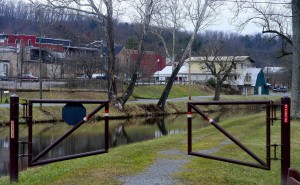From an Article by Michael Lewis, Hagerstown Herald Mail, August 20, 2019
BALTIMORE — A federal judge Wednesday upheld Maryland’s denial of an easement for a proposed natural-gas pipeline west of Hancock.
“We are pleased that the court has agreed that a private pipeline company cannot force the state to accept a pipeline under the Western Maryland Rail Trail,” Maryland Attorney General Brian Frosh said in a written statement. “We will continue to defend Maryland’s right to control its public lands against any other efforts by the natural gas industry to move forward with this project.”
The decision Wednesday came from a judge in the U.S. District Court in Baltimore.
Columbia Gas Transmission, a subsidiary of TC Energy, has proposed running the pipeline from existing facilities in Pennsylvania to a new Mountaineer Gas Co. pipeline in West Virginia.
Proponents have said the new pipeline is critical to economic development in West Virginia’s Eastern Panhandle.
“We will be evaluating our options in response to today’s decision,” Tim Wright, a spokesman for TC Energy, wrote in an email Wednesday. “We are committed to moving forward with this project to ensure that we can safely and reliably deliver a vital energy source to help power a region’s homes, businesses and economy.”
Opponents have said the pipeline, which would burrow more than 100 feet under the Potomac River, would threaten the environment and drinking water while bringing little benefit to the state.
“Really, why do we need this pipeline if it doesn’t benefit Maryland?” Brent Walls of the Potomac Riverkeeper Network said in an interview Wednesday.
The pipeline has been the subject of public meetings and debates for more than three years.
The project received permits from the Federal Energy Regulatory Commission, the Maryland Department of the Environment and the Maryland Department of Natural Resources. But protests against it continued in the Tri-State region and elsewhere in Maryland.
In court documents, Columbia Gas Transmission stated it has negotiated “the voluntary acquisition of easements” for 18 of the 22 tracts in the pipeline’s path. But it still needs easements to go under the Western Maryland Rail Trail and three parcels owned by the National Park Service. Those parcels are part of the Chesapeake & Ohio Canal National Historical Park.
Columbia is still awaiting a decision from the park service.
According to the paperwork, Columbia Gas offered the Maryland Department of Natural Resources $5,000 for the easement, which is more than the amount due as determined by an appraisal.
But in January, the state Board of Public Works denied Columbia’s easement application. Gov. Larry Hogan, Comptroller Peter Franchot and Treasurer Nancy Kopp voted unanimously.
At the time, Franchot cited “the compelling testimony of people who came down and said that they don’t think this is the right thing for the state of Maryland to do — that we weren’t gonna subject our state to all the environmental problems of this pipeline and get none of the economic benefits.”
In May, Columbia Gas Transmission sued. It asked the U.S. District Court in Baltimore to condemn about 0.12 acres for a 50-foot-wide and 102-foot-long easement, so the company can tunnel the 8-inch pipeline under the rail trail. Using a directional drilling method, the company would burrow the pipeline about 175 feet under the trail and about 114 feet under the river.
Columbia Gas argued that “time is of the essence” to meet the FERC deadline of July 19, 2020, and its “contractually committed in-service date” of Nov. 1, 2020.
But the state argued that the 11th amendment to the U.S. Constitution prevents a federal court from ordering the state to grant the easement.
Walls, the Upper Potomac riverkeeper, said he was in the courtroom Wednesday when the ruling was handed down. Walls said that, while the pipeline issue is important, another issue also is at stake.
Granting a private company the right of eminent domain over state-owned land would have “major, major implications,” he said.

